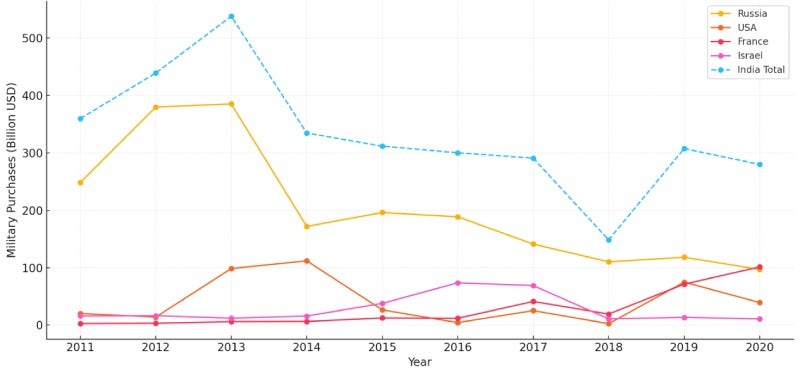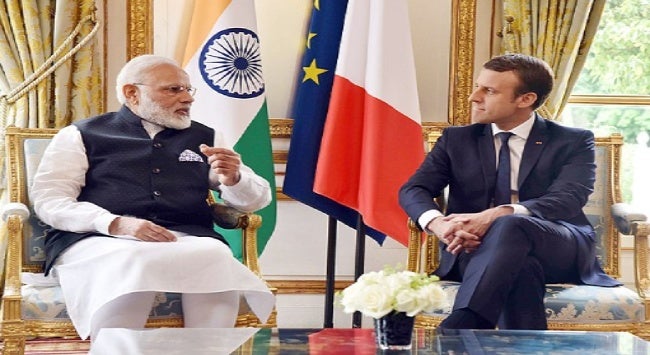Summary
On 11 February 2025, Indian Prime Minister Narendra Modi will visit France and co-chair the Artificial Intelligence (AI) Action Summit in Paris alongside French President Emmanuel Macron. This visit will not only focus on global AI issues but will also include significant announcements in the areas of defence, small modular reactors, and maintenance, repair and overhaul of aircrafts. Additionally, the two countries are expected to adopt the India-France AI Roadmap. Modi’s visit to France is set to become another critical milestone in the strategic cooperation between India and France, profoundly impacting the deepening of their strategic partnership in defence, technology and multilateral cooperation.
India and France have long maintained close cooperation, with their strategic partnership formally established in 1998. Following the introduction of their respective Indo-Pacific strategies, this partnership has been further reinforced. Amidst the profound transformation of the international order, their cooperation has expanded into emerging domains such as cybersecurity, renewable energy and governance in the Indian Ocean, exhibiting a comprehensive and multi-layered nature.
Since Prime Minister Narendra Modi took office, India and France have institutionalised regular bilateral security dialogues and consultation mechanisms covering defence, counterterrorism and cybersecurity. The two countries have convened multiple ministerial-level annual defence dialogues (held four times in 2018, 2019, 2021 and 2023), bilateral maritime cooperation dialogues (held seven times in 2015, 2017, 2018, 2019, 2021, 2023 and 2025) and cybersecurity dialogues (held four times in 2013, 2016, June 2019, 2021 and 2024).
In 2017, India and France signed the White Shipping Agreement, facilitating regular exchanges of commercial maritime information to enhance situational awareness in the Indian Ocean. The 2018 Agreement on Reciprocal Logistics Support for Armed Forces marked a milestone in institutionalising logistical support between the two militaries. The two countries have conducted multi-tiered joint military exercises across land, sea and air forces, including the 2021 carrier strike group exercise centred around the aircraft carrier Charles de Gaulle, the La Pérouse joint naval exercise and coordinated P-8I anti-submarine patrols, underscoring the deepening defence cooperation between India and France. Simultaneously, France has emerged as a key defense partner for India, with arms sales surging in 2020 and surpassing Russia for that year, while sustaining a strong presence as India’s second-largest supplier over a five-year period.
Figure 1: India’s Arms Imports from Russia, the United States, France and Israel (2011-2020)

Source: Database from Stockholm International Peace Research Institute, https://www.sipri.org/databases/armstransfers.
According to the latest report by the Stockholm International Peace Research Institute, the share of Russian arms in India’s total weapons imports declined to 36 per cent between 2019 and 2023, marking the first time in over six decades that it has fallen below 50 per cent. Meanwhile, India’s arms imports from France have increased significantly. French arms exports to India grew by 47 per cent, surpassing Russia and making France the world’s second-largest arms exporter. India accounted for nearly 30 per cent of France’s total arms exports, becoming its largest single client. Furthermore, India and France have made significant progress in defence-industrial cooperation and technology transfers, including the procurement and maintenance of Rafale fighter jets and the joint development of submarine projects. These collaborations have not only contributed to the modernisation of India’s defence industry but have also expanded market opportunities for France’s military-industrial sector.
The reasons behind this shift are multifaceted. On one hand, India and France align closely with the United States’ Indo-Pacific strategy and share a common strategic outlook on technological development, China’s rise and changes in the international order. New Delhi and Paris hold a broad consensus on strategic interests and values, both emphasising their political identity as democracies. They share a common perspective on upholding a free and open international order and constraining China’s influence in the Indian Ocean and the Pacific.
On the other hand, both nations seek to leverage their partnership to advance their respective strategic interests. France has strengthened its cooperation with India to support its Indo-Pacific strategy and safeguard its overseas territories, while India aims to secure its strategic interests in the Indian Ocean and enhance its ties with the European Union (EU) through closer collaboration with France.
However, despite the rapid expansion of India-France relations, certain divergences remain in their strategic priorities and perceptions of China. India’s ‘Make in India’ initiative, domestic scepticism over large-scale arms procurements and France’s multifaceted role in the EU’s affairs could pose challenges to deeper cooperation.
Looking ahead, the India-France partnership is expected to continue evolving, with both sides further reinforcing their strategic collaboration in the Indo-Pacific region.
. . . . .
Ms Bian Sai is an Academic Visitor at the Institute of South Asian Studies (ISAS), an autonomous research institute at the National University of Singapore (NUS). She can be contacted at isav34@partner.nus.edu.sg. The author bears full responsibility for the facts cited and opinions expressed in this paper.
Pic Credit: Wikimedia Commons
-
 More From :
More From :
-
 Tags :
Tags :
-
 Download PDF
Download PDF



